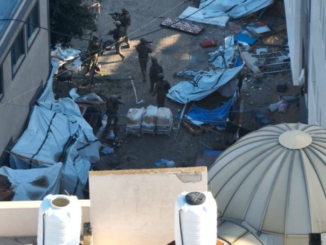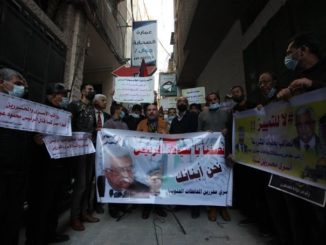
Not many of us have heard of #Ihbid194 prior to April this year. And no one thought that a simple act of mobilization on social media by a small group of Palestinian youth would turn in a short time into a real movement with thousands of social media activists ready around the clock to come in defense of Palestine.
A few months ago, few hundred Palestinian youths bombarded the National Geographic-Abu Dhabi Facebook Page with comments demanding it corrects a piece of information in one of its posts. The controversial post claimed that the ‘Nubian Ibex’ scale high cliffs in the Judean desert in ‘Israel’.
The youths pointed out that the mentioned desert is in Palestine and not in Israel. Their efforts paid off. The page administrators removed the original post and posted a new one stating that the Judean desert is in Palestine.
By May 2019, when Israel launched its latest offensive on Gaza, the group has become more organized and effective. Under the name of #Ihbid194, it was able to mobilize thousands of young Palestinian men and women on social media to refute the Israeli narrative and present the Palestinian side of the story. #Ihbid194 activists bombarded different social media pages including Israeli ones with comments that exposed Israeli lies and provided readers with real facts about Palestine, forcing some either to modify their posts or to delete them altogether.
In absence of a real official digital Palestinian presence on social media resulting in a very poor Palestinian narrative, a small group of youth from Palestine and the Diaspora has taken it upon themselves to fill the void. Ahmed Jouda, Hasan Aldawoudi, Amin Abed, Ali Shaath and Mahmoud Nashwan and others are the backbones of this new trend that is taking social media by a storm in defense of Palestine under the name of #Ihbid194.
The name was not chosen randomly but after much thought. The word Ihbid in Arabic means to ‘strike hard’ and 194 is the number of the UN resolution stipulating the right of return of Palestinian refugees to their homeland in addition to the number Palestine holds as a member state at the international organization.
Mainly through their Facebook and Twitter pages, #Ihbid194 identifies the target and explains to over 50,000 followers why it was chosen and what should be said in the comments and in which language.
Followers are constantly reminded of certain regulations such as not using any offensive language in their comments, always stating the facts in relation to the target at hand so as not to distract the reader, and to add the Palestinian flag at the end of each comment.
#Ihbid194’s targets are mostly chosen by the board of this movement but can as well be suggested by its followers.
Hasan Aldawoudi explains:
“Members of the higher council of #Ihbid194 and the team of translators are consulted on the nature of comments and in some specific cases we seek the advice of a number of academics and specialists to provide us with the right narrative on which we can build historical and scientific facts.”
According to Researcher in Digital Diplomacy Aziz Elmasri, Ihbid’s philosophy is to refute the Israeli official narrative, which is full of lies and defamation.
Elmasri says:
“They post written comments or images that illustrate the extent of killing of children, women and youth in Gaza and elsewhere and sometimes they support their posts by citing Israeli figures who oppose their government such as Israeli journalist Gideon Levy who wrote his famous opinion in Haaretz titled “The Gaza Ghetto Uprising.”
#Ihbid194’s Electronic Army works on two fronts. The first is identified as ‘hard strike’ (Al Habid Al Kasi) through which activists attack posts that contain incorrect or offensive information about Palestine or Palestinians, so as “to present the free world with logic and facts about our just Palestinian cause to expose the Zionist lies,” explains Aldawoudi.
The second is ‘soft strike’ (Al Habid Al Naaem) through which activists of #Ihbid194 back supporters of the Palestinian cause to ensure they are not alone and encourage them to take additional courageous positions.
Despite its young age and limited logistical and financial resources, #Ihbid194 made important victories in defense of the Palestinian cause. #Ihbid194’s Electronic Army triumphed in events like the Eurovision Song Contest held in Tel Aviv where numerous campaigns were made on the official page of the event and on pages of participating artists exposing the crimes of the Israeli occupation, and tens of artists went back on their decision to participate.
The group also supported the Icelandic band ‘Hatari’, who raised the Palestinian flag during the announcement of results, and was widely criticized by the organizers for ‘politicizing the event’. The band soon after released a song in solidarity with Palestine titled ‘Samed’ with Palestinian singer Bashar Murad in Arabic, and Icelandic.
#Ihbid194’s activists also showered Canadian Gospel singer Garth Hewitt with compliments for his song ‘My name is Palestine’. The artist was moved by the overwhelming support he received and sent the group a thank you note stating “he considers Palestine as his second home”.
#Ihbid194’s significant victory however was made during the commemoration of the 71st anniversary of Nakba where 33 pages of Israeli embassies celebrating the so-called ‘establishment of the Jewish state’ were bombarded with comments in several languages stating facts about Israel’s occupation and its consequences, which resulted in the deletion of several posts on these pages.
Aldawoudi says:
“Google is considered the hardest target so far, but nonetheless we were able to make a remarkable achievement when we forced the company to remove the Israeli flag in celebration of the establishment of the occupation state from the front of the main browser and limit it to a certain domain.”
One of the biggest challenges for #Ihbid194, besides the limited logistical and financial resources, since the initiative relies entirely on volunteer work, is the language barrier especially in languages that are not so common to Palestinians and Arabs.
Comments in certain languages remain a challenge for these young activists making them limited thus less effective since for any action to have a real impact, comments have to happen on a large scale.
The young group is under the limelight at present for the impact they have made in such a short time in defense of their country. Keeping up with developments in relation to the Palestinian cause is one of the group’s strengths, such as their campaign on social media against the ‘Manama Economic Conference’.
“#Ihbid194 is on its way of becoming a way of life to create a deterrent method for any digital platform whether Zionist or Arab that might think it could get away with lies regarding Palestine or its people. It could also become the nucleus of a future Palestinian digital diplomacy unit representing Palestine in the digital world in all languages”.
The absence of Palestinian digital diplomacy constitutes a challenge for the Palestinian narrative on social media, thus activism like that of #Ihbid194 found solid ground on cyberspace amongst young Palestinians and supporters of the cause. However, for this movement to continue and become a real pattern for Palestinian digital activism, there is still work to be done.
According to Elmasri, for #Ihbid194’s phenomenon to develop the youth need to strengthen their knowledge and their skills in presenting the idea without falling into the trap of being accused of anti-Semitism.
He concludes:
“In order to ensure the continuity of #Ihbid194, the youth have to have patience, but above all, they have to strengthen their historical and political background since the root of the conflict is a narrative one, and a solid ground is needed to counter that of the Israelis who are very active and skilled in digital diplomacy.”
#Ihbid194 has taken an important step in presenting the Palestinian narrative on cyberspace, but to ensure its sustainability the young group needs to be embraced on both the public and official levels. Additionally, things like training of activists, logistical and financial support are a priority to take #Ihbid194 to a more professional level in defense of Palestine and its just cause.
– Samaa Abu Sharar is a freelance journalist and researcher based in Beirut, Lebanon. She contributed this article to PalestineChronicle.com.







